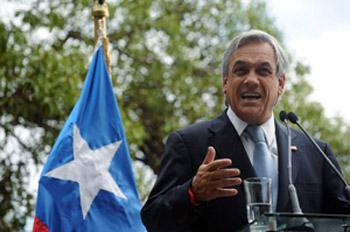Miners' solidarity sets example to a corrupt world

Solidarity had to be won in that mine in Chile, writes Vincent Browne.
In the early days after the mine collapsed on August 5, there were fistfights. Five of the miners who worked for a sub-contractor broke away. A few of the miners simply stayed in their beds underground, waiting to die.
But the extraordinary leadership of the foreman, Luis Urzúa, who fought for, and achieved, solidarity through democracy (decisions taken by the men together) rallied them.They agreed on a regime of strict food rationing - eating morsels only every 48 hours - to give themselves the longest possible time for a rescue to succeed.
It is certain that stories will emerge, over the coming weeks and months, of conflicts and divisions and disharmony, but the 33 men could not have survived without solidarity. Solidarity not just on the part of the miners, but on the part of the rescuers, particularly Manuel González Pavez, the first person to travel on the capsule into the mine, and the last person to exit the mine.
He was the first to test the safety of the rescue shaft and the capsule.
He was the only one to have gone into the capsule on his own, strapping himself in, closing the door, before returning to the surface. It was he who voluntarily risked most.
There was no solidarity on the part of the mine owners and managers, who knowingly risked the lives of the miners for corporate and individual profit.
The state of Chile had little concern either, although its president and mining minister milked the ordeal for all the advantage they could extract.
An average of 34 miners a year have died in mining accidents in Chile since 2000. In 2008, 43 miners were killed in Chilean mines.
The Copiapó mine is owned by the San Esteban Mining Company, which has had an appalling record of mining safety. It received 42 fines for breaking safety regulations between 2004 and 2010.
The mine was shut down after a miner had been killed there. It was allowed to reopen in 2008, although it had failed even then to comply with all regulations.
Chile has a light-touch regulatory system for mines, with about the same effectiveness as the light-touch regulation in Ireland for banking.
There are only three inspectors available to supervise conditions in 884 mines in the Atacama region, 500 miles north of Santiago, the region where the mining collapse occurred.
Chile first got converted to light-touch regulation during the dictatorship of Augusto Pinochet, when it adopted the neo-liberal socio-economic system devised in the economics departments of the US, and exported back from Chile to the US in the Reagan years, to Britain in the Thatcher years and to Ireland in the Bertie years.
The system ordains that the lightly-regulated workings of the free market provide the engine to drive economic growth, a growth which necessarily creates huge divisions of wealth and income.
Those divisions are regarded by the neocons as incidental and of inconsequence.
A champion of the Chilean experiment is the current president, Sebastián Pinera (pictured), who completed a doctorate in economics at Harvard and returned to Chile to make a billion-dollar fortune.
He came to own 100 per cent of Chilevisión, a TV channel broadcasting nationwide.
He owned 27 per cent of the LAN airline and, predictably, owns a football club as well, Colo Colo. He made most of his wealth by being the person who introduced credit cards to Chile.
In 1982, an arrest warrant was issued against Pinera when he was accused of violating banking law while he was general manager of the Bank of Talca.
He went on the run for 24 days, while his lawyers appealed the order. In July 2007, he was fined almost $700,000 by Chile's securities regulator for insider trading.
He made several attempts to become president and succeeded last January, having spent $13.6 million of his own money on the campaign. He took office in March, and was rarely off the world's television screens during the days of the rescue.
Significantly, the miners foreman, Luis Urzúa, said to Pinera right away on his release: ''This must not happen again." Of course, Pinera duly promised it wouldn't, but . . .
There is another recent event which I think is relevant here - a very different event - the Ryder Cup. Did you hear Graeme McDowell of Portrush say being part of the wining European Ryder Cup team was a far greater exhilaration than winning the US Open earlier this year?
Doesn't that say something, even about players in one of the most individuated sports in the world? His views were shared so vividly by his Ryder Cup team mates, as was the case in the K Club in 2006.
It is because we are social beings; we have come from society, been sustained by society.
And yet the political and economic system we have allowed assemble around us tries to subvert that sociability by incentivising us with private wealth, status and power, encouraging not the social dimension of our being, but the darker, atavistic side.
Atavism would not have sustained the miners in Chile, and it won't sustain us either in our own deep underground mine which has been dug for us by the Bertie boys.
